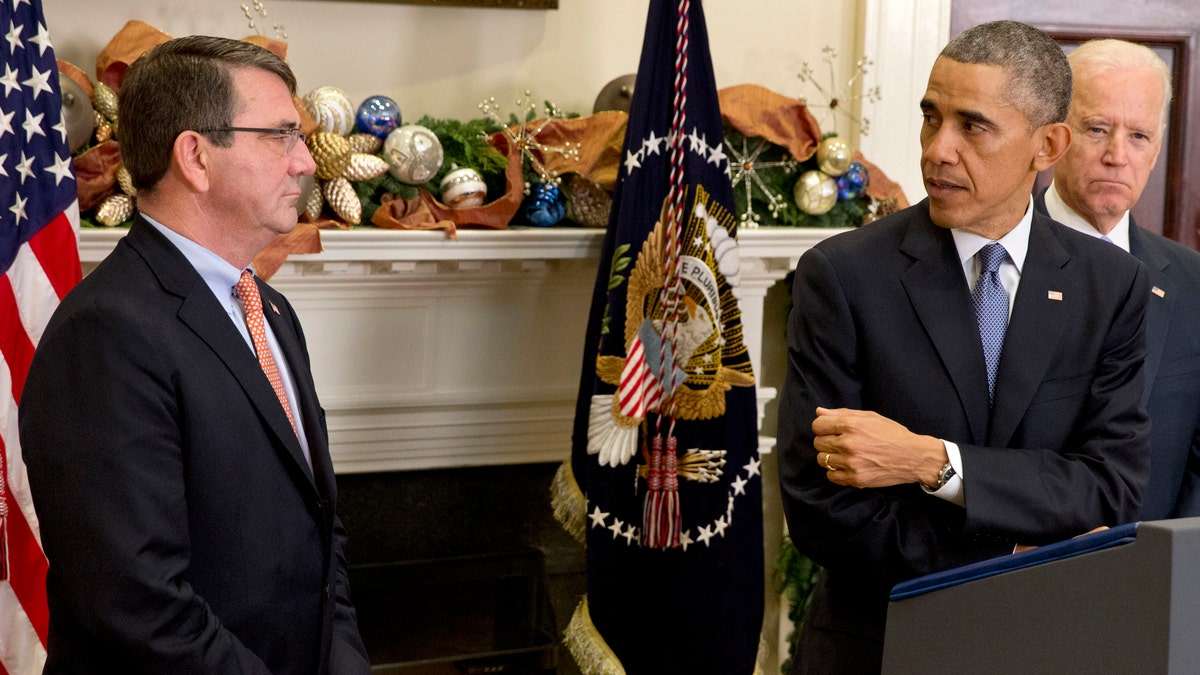
President Obama and Ashton Carter, his nominee for defense secretary, Friday, Dec. 5, 2014. (ap)
The – most likely – new U.S. Defense Secretary, Ashton Carter, has plenty on his plate in far-flung corners of the globe like Yemen and Afghanistan. He will also have plenty to keep him awake at night closer to home.
Now that the White House has upped the seriousness meter after once foolishly referring to the Islamic State as the junior varsity, the entire U.S. defense apparatus has calibrated itself around confronting this very real global threat.
Placing Mexico at the same level of importance as countries in the Middle East may be unrealistic, but the country with which we share a border and a complicated security relationship should at least be in the conversation.
There are gaping holes in the U.S.’ border security strategy, something made plain when thousands of undocumented minors were streaming across the U.S.-Mexico border this past summer. If the Islamic State is sophisticated enough to develop its own currency, then surely its operatives were paying attention. If kids who aren’t even old enough to rent a car could figure out how to get into the U.S. without documentation, then we should be very concerned about what a terrorist organization could do with a little motivation.
There are various scenarios with ISIL that could play out south of the border the incoming Secretary of Defense should be prepared to respond to.
Under one possibility, the same smuggling networks that were used to shuttle the Central American kids north could easily be adapted to help facilitate the passage of individuals who are hell bent on bringing their brand of destruction to the U.S. Mexican traffickers are business people always on the lookout for new clients. It’s not hard to envision smugglers who are used to shuttling drugs and illegal immigrants being exploited to help out dangerous people for the right price.
Under another scenario, the Mexican smuggling networks could balk at being drawn into any sort of deal with ISIL for reasons practical and personal. Traffickers have established relationships with Mexican law enforcement that often results in law enforcement looking the other way on illegal activity because of either a financial incentive or the threat of violence. ISIL infiltrating Mexican organized crime circles would completely upend the status quo and bring a new level of law enforcement scrutiny from both the U.S. and Mexican governments that could wreak havoc. Mexican crime bosses could determine that any deal with criminal enterprises beyond their bread and butter of drug and human trafficking isn’t worth the trouble.
These are admittedly the speculative musings of someone who has observed the ebbs and flows of the U.S.-Mexico security relationship and its effect on cross-border commerce and travel. Sometimes ham-fisted attempts to increase security have resulted in a drag on the ability to conduct legitimate business. Efforts to boost security, while well meaning, have directed limited resources at the wrong place and have relied on bad information. Ask any business if it believes the various government security programs aimed at the border and supply chains have made doing business any easier or made the border any more secure and the answers will be disappointing. Border security is getting better and is getting smarter, but we’re not where we need to be.
The Pentagon in this new era should seek to knock down the silos that plague all bureaucracies. Leaders at Homeland Security and the Department of Defense should understand each department’s priorities, strengths and weaknesses and forge a working relationship characterized by cooperation. Being on the same page is critical and having the courage of the leadership to so will factor in determining success.
President Obama pointed out that the fuzzy alliances between the U.S. and various factions in Syria are contradictions “in a contradictory land and a contradictory circumstance.” U.S. defense and border security agencies might have to employ that same contradictory thinking if terrorist networks gain a foothold in Mexico and the U.S. is forced to explore a tenuous alliance with elements that have typically been a law enforcement target.
The new defense secretary will face the challenge of getting his point of view across in a White House that has been criticized for turning a deaf ear to the Pentagon. Placing Mexico at the same level of importance as countries in the Middle East may be unrealistic, but the country with which we share a border and a complicated security relationship should at least be in the conversation.
